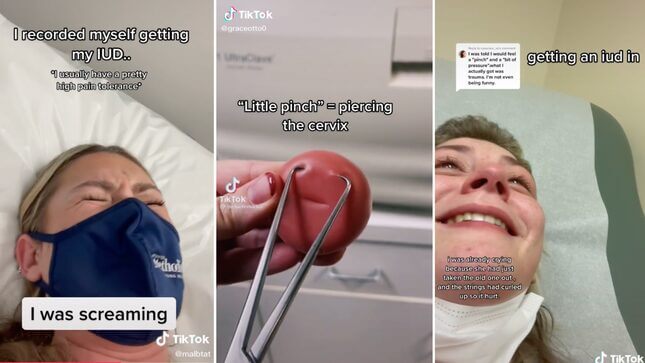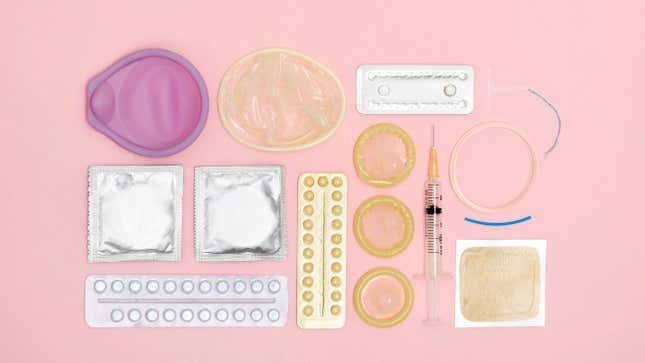TikToks About ‘Traumatizing’ IUD Pain Go Viral as Some Doctors Refuse to Remove Them
The political war on birth control is very much real, but that doesn’t mean the intense pain of IUD insertion isn’t. Jezebel spoke to some frustrated patients.
In Depth

When TikToker Bridget Goes took a video of herself getting her first IUD removed and her second one inserted in June, she didn’t expect the video to go viral, drawing nearly 900,000 views since. In the video, Goes is visibly and audibly in agony. “i need anyone who wants to get an iud understand it can be traumatic,” the caption of her TikTok reads. “it was traumatic for me.”
Goes told Jezebel she initially wasn’t sure she wanted to post such “an innately intimate” video, which stands out from her posts primarily centered around Harry Styles and her cat. “I took the video for myself, because I was so traumatized by the first one that I pushed the memory out of my brain and wanted to remember the second time,” she said in a phone interview. Since posting it, she’s been heartened by the support she’s received—especially from others who endured similarly painful experiences getting an IUD inserted without any pain medication. Goes says she’s had broken bones, and “the IUD was still by far the most painful experience.”
IUDs are a great option for those who can weather the pain of insertion, who don’t experience side effects, and who seek a long-acting contraceptive or alternative to the pill. But frustration around IUDs has been a hot topic of late: Last month, one woman shared her story of searching for an OB-GYN to remove her IUD, only to be turned away by all of them. IUD removal is expensive, and people who have tried to have their devices removed say doctors often push back on their requests—which is especially egregious considering the lack of pain management.
For all the comfort Goes has found in people’s supportive responses, she’s also concerned about her video possibly being used to fearmonger and spread disinformation about IUDs, which are over 99% effective at preventing pregnancy, and other forms of birth control. “I didn’t like people saying, ‘Oh no, I don’t wanna get an IUD now,’” Goes said, emphasizing that hers was one of many different experiences with the contraceptive method and that she still very much trusts doctors and health care workers. TikTok, she observed, is a valuable platform for people to share stories and listen to each other—but in some contexts, it’s also become a pipeline for misinformation.
Earlier this month, researchers from Duke University found that of the 100 most viewed videos that are tagged #IUD on TikTok, about 38% had a “negative tone,” 28% expressed distrust of health care workers, and about a quarter pushed “moderately or highly inaccurate scientific claims.” Speaking of “inaccurate” claims, just last year, several TikTokers went viral by claiming to have removed their own IUDs at home and encouraging viewers to do the same. Doctors quickly responded by warning that doing so could result in serious complications, like uterine prolapse.
@graceotto0 #stitch with @chelseahartisme #greenscreen #iud #ouch #notpainless kinda weird that she “liked” a procedure that pierces internal organs but whatever
Dr. Raegan McDonald-Mosley, CEO of birth control advocacy organization Power to Decide, says that this reality coexists with the fact that IUDs are a safe, important birth control option for people to have available to them. Patients should be getting comprehensive, accurate information from doctors, she says—and doctors should listen to them about the pain they’re experiencing.
“Any conversation about birth control should include a review of the risks, benefits, and alternatives of each method. And that conversation should make space for finding a method that works for the individual, for a supportive provider,” McDonald-Mosley told Jezebel. She emphasized that “it’s important that we don’t minimize people’s experiences with pain” and “also explain that the experience can be very variable.”
-

-

-

-

-

-

-

-

-

-

-

-

-

-

-

-

-

-

-

-

-

-

-

-

-

-

-

-

-

-

-

-

-

-

-

-

-

-

-

-









































